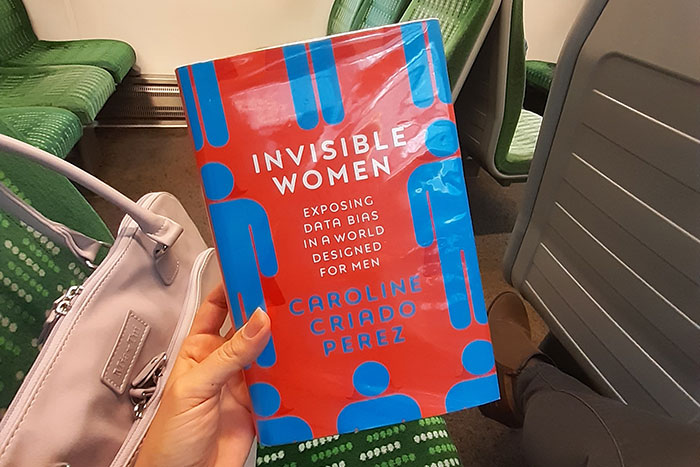

Speech-recognition software is trained on recordings of male voices: Google’s version is 70% more likely to understand men. The average smartphone – 5.5 inches long – is too big for most women’s hands, and it doesn’t often fit in our pockets. Gender-blindness in tech culture produces what Criado Perez calls the “one-size-fits-men” approach. One woman reported that her car’s voice-command system only listens to her husband, even when he's in the passenger seat Cars are designed around the body of “Reference Man”, so although men are more likely to crash, women involved in collisions are nearly 50% more likely to be seriously hurt. Women in Britain are 50% more likely to be misdiagnosed following a heart attack: heart failure trials generally use male participants. Most offices, we learn, are five degrees too cold for women, because the formula to determine their temperature was developed in the 1960s based on the metabolic resting rate of a 40-year-old, 70kg man women’s metabolisms are slower. This is a man’s world, we learn, because those who built it didn’t take gender differences into account. Criado Perez has assembled a cornucopia of statistics – from how blind auditions have increased the proportion of female players hired by orchestras to nearly 50%, to the good reasons why women take up to 2.3 times as long as men to use the toilet. It’s a smart strategy, therefore, to invite readers to view this timeworn topic through the revealing lens of data, bringing to light the hidden places where inequality still resides. When the writer and activist Caroline Criado Perez campaigned to have a female historical figure on the back of sterling banknotes, one man responded: “But women are everywhere now!” A recent large survey revealed that more than two thirds of men in Britain believe that women now enjoy equal opportunities. We mistake our fatigue about feminism for the exhaustion of patriarchy. Unfortunately for women, though, the hoary old problems of discrimination, violence and unpaid labour are still very much with us. The attention of a jaded public and neophiliac media may have been aroused by #MeToo, with its connotations of youth, sex and celebrity, but for the most part it has drifted recently towards other forms of prejudice, such as transphobia. Her first book, Do it Like a Woman, was published in 2015.The problem with feminism is that it’s just too familiar. Caroline was awarded an OBE in the Queen's Birthday Honours 2015. Her most notable campaigns have included co-founding The Women's Room, getting a woman on Bank of England banknotes, forcing Twitter to revise its procedures for dealing with abuse and successfully campaigning for a statue of suffragist Millicent Fawcett to be erected in Parliament Square. About the authorĬaroline Criado Perez is a writer, broadcaster and award-winning feminist campaigner. From government policy and medical research, to technology, workplaces, urban planning and the media, Invisible Women reveals the biased data that excludes women. It exposes the gender data gap–a gap in our knowledge that is at the root of perpetual, systemic discrimination against women, and that has created a pervasive but invisible bias with a profound effect on women’s lives. Invisible Women shows us how, in a world largely built for and by men, we are systematically ignoring half the population. If any of this sounds familiar, chances are that you're a woman. Imagine a world where your phone is too big for your hand, where your doctor prescribes a drug that is wrong for your body, where in a car accident you are 47% more likely to be seriously injured, where every week the countless hours of work you do are not recognised or valued.


 0 kommentar(er)
0 kommentar(er)
